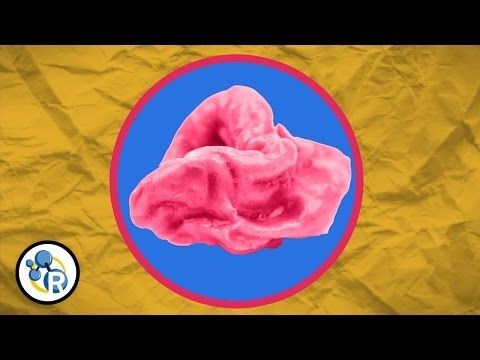Swallowing Gum Doesn’t Mean It’ll Be In Your Stomach For 7 Years; Your Digestive Tract Is More Efficient Than That

We’ve all swallowed a piece of gum as a kid (or maybe even as an adult) and wondered if it would still be in our stomachs years later, sticking to the lining, unchanged. But it turns out that’s never really the case, as the human stomach is tough and acidic, and also efficient when it comes to passing items that it can’t break down.
In a new Reactions video, we learn what happens to a piece of gum after it’s swallowed and travels through our bodies. First, to understand how our bodies would handle this “non-food” item, we have to know that gum is made of four main components: sweetener, flavoring, softening/bulking agents, and a rubber base. The first three things can typically be broken down by the stomach’s enzymes and acids, but since rubbers are made up of polymers, that’s a bit harder to break down.
Food is made up of molecules like fats, carbohydrates, and proteins. Enzymes in the stomach, like lipase, amylase, and pepsin, respectively break those molecules down into nutrients the body can use. Afterwards, gastric acid — which is made up of hydrochloric acid and salts in the stomach — dissolves the food mix even further, turning it into a sludge that can easily go through the intestines, which absorb nutrients. The remaining stuff, waste, is excreted from the body.
The video breaks down digestion into several steps: mechanical, enzyme breakdown, and gastric acid work. After you swallow a wad of gum, the carbohydrates, oils, and alcohols in the gum are broken down by amylase, lipase, and ADH enzymes, respectively. But there’s no enzyme for rubber polymers, which can also withstand gastric acid. That leaves the gum rubber undigested.
At the end of the day, however, the undigested part doesn’t simply stay in your stomach. By now, it has moved into your intestines, where it passes with the rest of the unused stuff. Your body has to expel lots of undigested parts of food every day, like parts of grains and even fiber — which stays in your gastrointestinal tract (providing the body benefits) until it’s excreted. If you’ve swallowed several wads of gum in your day, you can rest assured they’re not still stuck in your stomach; there's quite a bit of evidence that was just an old wives' tale.



























